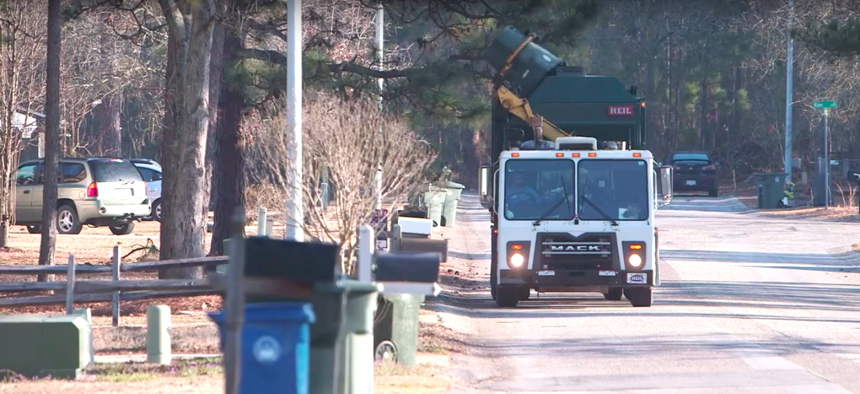How a Simple Sticker Can Nudge Residents Into Compliance

“People generally have limited attention, which means that we fail to consider small details.”
Students at Duke University's Sanford School of Public Policy partnered with the city of Fayetteville, North Carolina's Environmental Services Department on a behavioral economics experiment aimed at improving residents’ compliance with garbage collection.
The city began phasing in automated side-loader garbage trucks, nicknamed “one-armed bandits,” in the past few years because only one operator is needed, as opposed to two or three people on rear-loader trucks.
But many residents still aren’t aware they need to change the way they position garbage bins on by the curb to account for the trucks’ mechanical arms, and almost 50 percent of single-family homes in the city are rental—meaning regular homeowner turnover.
“It’s a re-education process all the time for us,” Jackie Tuckey, a public information specialist, says in this Sanford School video .
One homes misplaced garbage bins force the truck driver to get out, move the can and pick up any loose trash, and the collective impact of 100 residents in a subdivision failing to follow the rules is a significant drain on time and resources.
Garbage bin handles must face toward the home for truck arms to grab them, and the containers themselves must be placed away from mailboxes, low-hanging trees and cars.
“People generally have limited attention, which means that we fail to consider small details,” says Mariel Beasley, who teaches Behavioral Economics for Municipal Policy at the Sanford School along with Professor Dan Ariely.
Sanford School students arranged two interventions on behalf of government: a personalized letter addressed to the resident from the trash collector and a sticker placed on the garbage bin displaying the rules of trash collection. Residents either received a letter, a sticker or both.
While the letter personalized the problem and pointed out the collective impact of poor behavior on individual trash collectors, the sticker served as a visual reminder precisely at the moment homeowners were acting.
The result of the experiment? Stickers alone proved incredibly helpful.
“Finding these little ways to help nudge people in the right direction makes everyone better off,” says student Mary Greer Simonton.
Dave Nyczepir is a News Editor at Government Executive's Route Fifty and is based in Washington D.C.
NEXT STORY: A Grim Task Following Oakland’s Deadly Fire; New Airbnb Regs in New Orleans






